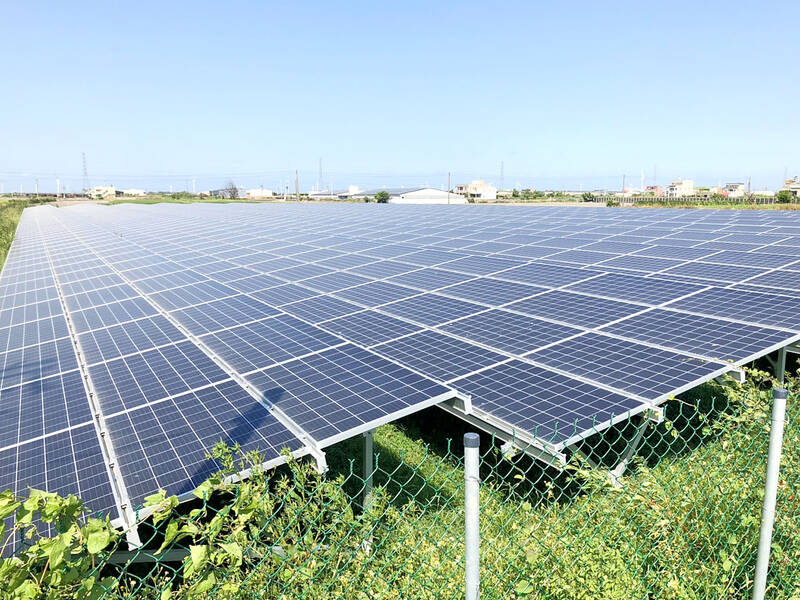The Changhua County Prosecutors’ Office has indicted 14 people, including mayors and representatives of the county’s Jhutang Township (竹塘) and Yunlin County’s Erlun Township (二崙), on charges of accepting millions of dollars in kickbacks related to green-energy projects.
Jhutang Township Mayor Tsai Shuo-jen (蔡碩任), along with Jhutang Township Council Speaker Lin Shu-nu (林淑女) and her husband, Tsai Yue-yang (蔡岳陽), allegedly leaked information on the bidding for a photovoltaic power plant and received NT$440 million (US$13.57 million) in kickbacks for two projects, the indictment issued on Monday read.
In 2021, Tsai Yue-yang and green-energy developers, together with a representative of a photovoltaic company surnamed Lin (林), persuaded Tsai Shuo-jen to process the Jhutang Public Cemetery lease as a photovoltaic power generation project, promising the mayor NT$4,500 for every 1,000 kilowatt-peak generated, the indictment said.

Photo: Chang Tsung-chiu, Taipei Times
Kilowatt-peak denotes the peak performance capability of a photovoltaic system or solar panel.
Tsai Yue-yang and Lin Shu-nu received NT$14.47 million and NT$6 million respectively for facilitating the deal, it said.
In 2022, Tsai Yue-yang further persuaded Tsai Shuo-jen to initiate projects to install rooftop solar panels and divide the project into separate bids in contravention of the Government Procurement Act (政府採購法), it said.
The 2022 project allegedly benefited a developer surnamed Lee (李), who received NT$27.34 million from Taiwan Power Co’s (台電) purchase of the power generated, it said.
Erlun Township Mayor Chung Tung-jung (鍾東榮) and Erlun Township Council Speaker Yang Shih-pin (楊世彬) face the same charges, with Chung accused of hiding NT$9.2 million in illegal kickbacks in a family temple, the indictment said.
Prosecutors have asked for eight, 11, 12 and 11-year prison sentences for Tsai Shuo-jen, Chung, Lin Shu-nu and Yang respectively.
A source in the photovoltaic energy production industry, speaking on the condition of anonymity, said that the rapid growth in the nation’s green-energy market in the past few years has resulted in exorbitant pricing, cutthroat competition and sometimes illegal activity.
Prosecutors said it was inevitable that the development of green-energy systems would result in actors seeking to cash in, but government officials must adhere to the law when processing procurement projects, and instead of seeking bribes, should encourage developers to give back to the community.

DEMOGRAPHICS: Robotics is the most promising answer to looming labor woes, the long-term care system and national contingency response, an official said Taiwan is to launch a five-year plan to boost the robotics industry in a bid to address labor shortages stemming from a declining and aging population, the Executive Yuan said yesterday. The government approved the initiative, dubbed the Smart Robotics Industry Promotion Plan, via executive order, senior officials told a post-Cabinet meeting news conference in Taipei. Taiwan’s population decline would strain the economy and the nation’s ability to care for vulnerable and elderly people, said Peter Hong (洪樂文), who heads the National Science and Technology Council’s (NSTC) Department of Engineering and Technologies. Projections show that the proportion of Taiwanese 65 or older would

Nvidia Corp yesterday unveiled its new high-speed interconnect technology, NVLink Fusion, with Taiwanese application-specific IC (ASIC) designers Alchip Technologies Ltd (世芯) and MediaTek Inc (聯發科) among the first to adopt the technology to help build semi-custom artificial intelligence (AI) infrastructure for hyperscalers. Nvidia has opened its technology to outside users, as hyperscalers and cloud service providers are building their own cost-effective AI chips, or accelerators, used in AI servers by leveraging ASIC firms’ designing capabilities to reduce their dependence on Nvidia. Previously, NVLink technology was only available for Nvidia’s own AI platform. “NVLink Fusion opens Nvidia’s AI platform and rich ecosystem for

Taiwan Semiconductor Manufacturing Co (TSMC, 台積電) yesterday said it is building nine new advanced wafer manufacturing and packaging factories this year, accelerating its expansion amid strong demand for high-performance computing (HPC) and artificial intelligence (AI) applications. The chipmaker built on average five factories per year from 2021 to last year and three from 2017 to 2020, TSMC vice president of advanced technology and mask engineering T.S. Chang (張宗生) said at the company’s annual technology symposium in Hsinchu City. “We are quickening our pace even faster in 2025. We plan to build nine new factories, including eight wafer fabrication plants and one advanced

‘WORLD’S LOSS’: Taiwan’s exclusion robs the world of the benefits it could get from one of the foremost practitioners of disease prevention and public health, Minister Chiu said Taiwan should be allowed to join the World Health Assembly (WHA) as an irreplaceable contributor to global health and disease prevention efforts, Minister of Foreign Affairs Lin Chia-lung (林佳龍) said yesterday. He made the comment at a news conference in Taipei, hours before a Taiwanese delegation was to depart for Geneva, Switzerland, seeking to meet with foreign representatives for a bilateral meeting on the sidelines of the WHA, the WHO’s annual decisionmaking meeting, which would be held from Monday next week to May 27. As of yesterday, Taiwan had yet to receive an invitation. Taiwan has much to offer to the international community’s